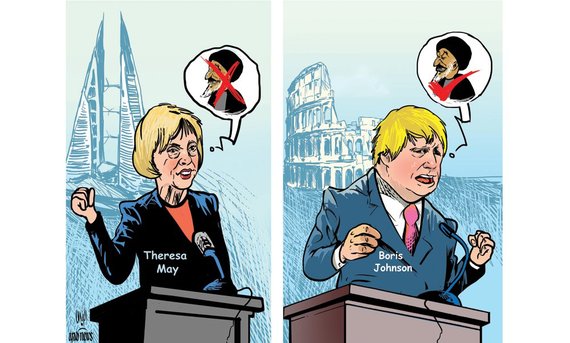British Prime Minister Theresa May's speech at the Gulf Cooperation Council (GCC) Summit deserves a solid 10/10. Starting off with "Gulf security is our security" was a pleasant surprise and a much-welcomed statement. Compared to the soon-to-be-dismissed Obama administration, May came across as bold and better informed when she stated that she was "clear-eyed" about the security threat that Iran posed, and that the UK would work with the Gulf states to counteract Tehran's "aggressive regional actions." Knowing exactly which buttons to press, she paid homage to 200 years of bilateral relations with Manama and Gulf reform plans, and confirmed the UK's participation in Dubai's Expo 2020. However, one should be wary of the Brits when they come bearing gifts. On the one hand, of course this is all excellent news for the region, particularly as it comes alongside an actual commitment of a military presence and assistance to Gulf nations in building up their defense capabilities. On the other hand, we must not forget the realities on the ground that may have resulted in this sudden British warming up. Ever since this summer's Brexit vote, the UK has been scrambling to secure a favorable position and global guarantees for when it leaves the European Union (EU). It is no surprise, then, that the emphasis on ramping up trade with the GCC took up a major part of May's speech and her pre-Summit negotiations. This is without doubt a good opportunity for GCC countries -- unilaterally and collectively -- to strengthen ties with the UK, and if the British government abides by the commitments made in Manama, one cannot but expect a mutually beneficial future for all parties involved. However, mere lip service is no longer sufficient; it is actions, not words, which both sides should be after. The UK should not expect to be able to have its cake and eat it, as a recently leaked memo seems to explain of their EU-exit strategy. Nobody anticipates that the UK will completely cut ties with Iran, particularly given that the two countries have only just re-established political ties. However, one would like to see Hamid Baeedinejad -- the newly appointed Iranian ambassador, who submitted his credentials to Queen Elizabeth II a few days ago -- summoned and questioned should Tehran continue its destabilizing acts in the region. Furthermore, there seems to be a vast contrast of views within the British government between PM May -- who whilst in Manama criticized Tehran and lauded Riyadh for its visionary leadership -- and her Foreign Secretary Boris Johnson who criticized Saudi Arabia, and seemingly blamed it alongside Iran for the region's turmoil, during the second annual Med conference, which was held a few days ago in Rome. What also does not help May's position are reports of the keenness of Boris Johnson, as well as that of UK trade and investment delegations, to visit Tehran and ease US President-elect Donald Trump's criticism of the nuclear deal. Any trade with Tehran should be coupled with guarantees that prevent Iran from using its newly earned cash to continue financing terrorism. After all, nobody in their right mind would argue against the fact that a nuclear-free Iran is safer for both regional and global security. However, British officials and companies should remember that it is very likely that any money that Tehran generates off their back may end up straight in the pockets of Houthis attacking Makkah, Syrian President Bashar Assad barrel-bombing his people, or Iranian militias killing innocent civilians in Iraq. If we are to hold May to her words and commitments to the security of the region, then curbing her government's own enthusiasm toward Tehran is the least to be asked. *This blog was originally published in Arab News.
To succeed with GCC, Britain can't 'have the cake and eat it'
To succeed with GCC, Britain can't 'have the cake and eat it'
This post was published on the now-closed HuffPost Contributor platform. Contributors control their own work and posted freely to our site. If you need to flag this entry as abusive, send us an email.

